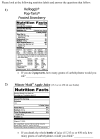Randomized nutrition education intervention to improve carbohydrate counting in adolescents with type 1 diabetes study: is more intensive education needed?
- PMID: 22975086
- PMCID: PMC3487717
- DOI: 10.1016/j.jand.2012.06.001
Randomized nutrition education intervention to improve carbohydrate counting in adolescents with type 1 diabetes study: is more intensive education needed?
Abstract
Background: Youth with type 1 diabetes do not count carbohydrates accurately, yet it is an important strategy in blood glucose control.
Objective: The study objective was to determine whether a nutrition education intervention would improve carbohydrate counting accuracy and glycemic control.
Design: We conducted a randomized, controlled nutrition intervention trial that was recruited from February 2009 to February 2010.
Subjects: Youth (12 to 18 years of age, n = 101) with type 1 diabetes were screened to identify those with poor carbohydrate counting accuracy, using a previously developed carbohydrate counting accuracy test covering commonly consumed foods and beverage items presented in six mixed meals and two snacks. All participants (n = 66, age = 15 ± 3 years, 41 male, diabetes duration = 6 ± 4 years, hemoglobin A1c [HbA1c] = 8.3% ± 1.1%) were randomized to the control or intervention group at the baseline visit. The intervention group attended a 90-minute class with a registered dietitian/certified diabetes educator and twice kept 3-day food records, which were used to review carbohydrate counting progress.
Main outcome measures: Carbohydrate counting accuracy (measured as described) and HbA1c were evaluated at baseline and 3 months to determine the effectiveness of the intervention.
Statistical analyses performed: t Tests, Spearman correlations, and repeated measures models were used.
Results: At baseline, carbohydrate content was over- and underestimated in 16 and 5 of 29 food items, respectively. When foods were presented as mixed meals, participants either significantly over- or underestimated 10 of the 9 meals and 4 snacks. After 3 months of follow-up, HbA1c decreased in both the intervention and control groups by -0.19% ± 0.12% (P = 0.12) and -0.08% ± 0.11% (P = 0.51), respectively; however, the overall intervention effect was not statistically significant for change in HbA1c or carbohydrate counting accuracy.
Conclusions: More intensive intervention might be required to improve adolescents' carbohydrate counting accuracy and nutrition management of type 1 diabetes. Additional research is needed to translate nutrition education into improved health outcomes.
Copyright © 2012 Academy of Nutrition and Dietetics. Published by Elsevier Inc. All rights reserved.
Figures
Similar articles
-
The diabetes nutrition education study randomized controlled trial: A comparative effectiveness study of approaches to nutrition in diabetes self-management education.Patient Educ Couns. 2016 Aug;99(8):1368-76. doi: 10.1016/j.pec.2016.03.017. Epub 2016 Mar 19. Patient Educ Couns. 2016. PMID: 27026388 Free PMC article. Clinical Trial.
-
Effects of basic carbohydrate counting versus standard outpatient nutritional education (The BCC Study): study protocol for a randomised, parallel open-label, intervention study focusing on HbA1c and glucose variability in patients with type 2 diabetes.BMJ Open. 2019 Nov 21;9(11):e032893. doi: 10.1136/bmjopen-2019-032893. BMJ Open. 2019. PMID: 31753900 Free PMC article.
-
Comparing the Effectiveness of Different Dietary Educational Approaches for Carbohydrate Counting on Glycemic Control in Adults with Type 1 Diabetes: Findings from the DIET-CARB Study, a Randomized Controlled Trial.Nutrients. 2024 Oct 31;16(21):3745. doi: 10.3390/nu16213745. Nutrients. 2024. PMID: 39519579 Free PMC article. Clinical Trial.
-
[Correctly estimating and appreciating carbohydrates. Nutrition in diabetes mellitus].MMW Fortschr Med. 2007 Sep 13;149 Suppl 3:91-6. MMW Fortschr Med. 2007. PMID: 17955785 Review. German.
-
Carbohydrate Counting in Children and Adolescents with Type 1 Diabetes.Nutrients. 2018 Jan 22;10(1):109. doi: 10.3390/nu10010109. Nutrients. 2018. PMID: 29361766 Free PMC article. Review.
Cited by
-
Bridging the Gap in Carbohydrate Counting With a Mobile App: Needs Assessment Survey.J Med Internet Res. 2025 Mar 28;27:e63278. doi: 10.2196/63278. J Med Internet Res. 2025. PMID: 40153793 Free PMC article.
-
Effect of adherence to carbohydrate counting on metabolic control in children and adolescents with type 1 diabetes mellitus.Ann Pediatr Endocrinol Metab. 2020 Sep;25(3):156-162. doi: 10.6065/apem.1938192.096. Epub 2020 Jul 29. Ann Pediatr Endocrinol Metab. 2020. PMID: 32871653 Free PMC article.
-
Evaluation of carbohydrate counting knowledge among individuals with type 1 diabetes mellitus in Saudi Arabia: a cross-sectional study.BMJ Nutr Prev Health. 2022 Nov 28;5(2):344-351. doi: 10.1136/bmjnph-2022-000553. eCollection 2022 Dec. BMJ Nutr Prev Health. 2022. PMID: 36619333 Free PMC article.
-
Clinical Utility of Psychoeducational Interventions for Youth with Type 1 Diabetes: A Scoping Review.Contin Educ. 2021 Jul 15;2(1):76-108. doi: 10.5334/cie.28. eCollection 2021. Contin Educ. 2021. PMID: 38774890 Free PMC article.
-
Effectiveness of medical nutrition therapy in adolescents with type 1 diabetes: a systematic review.Nutr Diabetes. 2022 Apr 22;12(1):24. doi: 10.1038/s41387-022-00201-7. Nutr Diabetes. 2022. PMID: 35459205 Free PMC article.
References
-
- Danne T, Mortensen HB, Hougaard P, et al. Persistent differences among centers over 3 years in glycemic control and hypoglycemia in a study of 3,805 children and adolescents with type 1 diabetes from the Hvidore Study Group. Diabetes Care. 2001;24(8):1342–1347. - PubMed
-
- Postprandial blood glucose. American Diabetes Association. Diabetes Care. 2001;24(4):775–778. - PubMed
-
- Sheard NF, Clark NG, Brand-Miller JC, et al. Dietary carbohydrate (amount and type) in the prevention and management of diabetes: a statement by the american diabetes association. Diabetes Care. 2004;27(9):2266–2271. - PubMed
-
- Rabasa-Lhoret R, Garon J, Langelier H, Poisson D, Chiasson JL. Effects of meal carbohydrate content on insulin requirements in type 1 diabetic patients treated intensively with the basal-bolus (ultralente-regular) insulin regimen. Diabetes Care. 1999;22(5):667–673. - PubMed
-
- Bantle JP, Wylie-Rosett J, Albright AL, et al. Nutrition recommendations and interventions for diabetes: a position statement of the American Diabetes Association. Diabetes Care. 2008;31(Suppl 1):S61–S78. - PubMed



